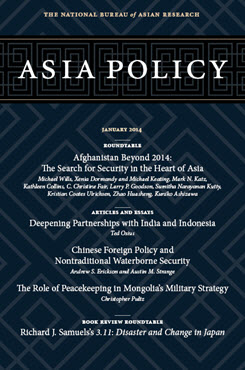Japanese Assistance in Afghanistan
Helping the United States, Acting Globally, and Making a Friend
This is one of nine essays in the roundtable “Afghanistan Beyond 2014: The Search for Security in the Heart of Asia.”
Although Japan has rarely been mentioned in regular international or U.S. news coverage on Afghanistan, the Japanese government has been a major player in international assistance for Afghanistan over the past decade. In early 2002, just a few months after the fall of the Taliban, it hosted the first major international conference on the reconstruction of Afghanistan, effectively setting up the prototype of the so-called pledging conference for Afghan reconstruction that has been subsequently held in other major capitals at two-year intervals. Ten years later, Tokyo convened another major conference that critically coordinated international assistance for Afghanistan through the 2014 transition period and beyond until 2016.
This essay provides a brief overview of Japan’s major engagements in Afghanistan, identifies the key motivations behind them, and assesses their impact in terms of Tokyo’s foreign policy objectives. Given that Japan has conducted its Afghan policymaking largely, though not exclusively, in the context of U.S.-Japan alliance management, the winding down of this signature decade-long foreign policy commitment is inevitable after 2014, when most of the U.S. and wider NATO forces withdraw from Afghanistan.
Japanese Engagement in Afghanistan
Japan assumed the “lead country” role for one of the five major security-sector reform programs—the so-called DDR program to disarm, demobilize, and reintegrate former combatants into Afghan society—that were introduced as the main pillars of Afghan reconstruction and stabilization. The assumption of this role effectively positioned Japan as a principal player in international assistance in Afghanistan, alongside the United States (which assumed the lead-country role for re-establishing the Afghan military), Germany (for police reform), the United Kingdom (for counternarcotics), and Italy (for judicial reform). Although constitutional and other domestic political constraints prevented Japan from participating in the U.S.-led counterterrorism military operation (Operation Enduring Freedom) and the NATO-led security assistance mission (the International Security Assistance Force, or ISAF), Tokyo came up with a creative way to enable its military to contribute. From late 2001 until the beginning of 2010, naval ships from the Japan Self-Defense Forces (SDF) were deployed in the Indian Ocean to refuel U.S. and other international naval vessels engaged in Operation Enduring Freedom. The total operation cost amounted to $800 million, with around $250 million spent on supplying fuel and water to coalition forces. [1]
Besides such diplomatic activism and unprecedented operations by the SDF, the most significant element of Japan’s involvement in Afghanistan has been its substantial financial contribution to help stabilize and reconstruct this war-torn society. Since late 2001, Japan has spent almost $5 billion on various reconstruction and stabilization projects in Afghanistan. Overall, Japan ranks second, after only the United States, in financial assistance to the country, with its pledges totaling about $8 billion. [2] Close to half of Japanese aid was disbursed for reconstruction assistance, such as infrastructure building, agriculture and rural development, and health and education improvement, while one-third was directed toward security-related programs, most notably supporting the salary of Afghan police and the aforementioned DDR projects. The rest—somewhere between 20% and 25%—was spent on projects to improve governance and on humanitarian assistance. A conspicuously large amount of Japanese financial assistance—more than 60%—was channeled through international organizations, such as the UN Development Programme, the UN Children’s Fund (UNICEF), the UN Educational, Scientific and Cultural Organization (UNESCO), and the World Food Programme, while about one-third was disbursed as direct bilateral grants to the Afghan government or NGOs providing official development assistance. Japan’s own NGO, the Japan International Cooperation Agency (JICA), has handled only 9% of…
[1] Based on data from National Diet Library, Foreign and Defense Policy Division, “Tero tokusoho no kigenencho o meguru ronten: Dai 168-kai rinji kokkai no shingi no tameni” [Issues Concerning the Extension of the Anti-Terrorism Special Measures Law: For the 168th Special Diet Session], Chousa to Jouho [Issue Brief], no. 594 , September 20, 2007, 12; and Ministry of Defense (Japan), Terotaisaku kaijosohikatsudo nitaisuru hokyushienkatsudo no jisshi ni kansuru tokubestusochiho nimotozuku hokyushienkatsudo no kekka [Report on SDF’s Refueling Operation in support of Operation Enduring Freedom–Maritime Interdiction Operation under the Anti-Terrorism Special Measures] (Tokyo, 2010), appendix 1-2.
[2] Ministry of Finance (Aghanistan), “Development Cooperation Report 2011” (Kabul, 2012), 48; and Ministry of Foreign Affairs (Japan), Nihon no Ahuganisutan eno shien: Jiritsushita Ahuganisutan ni mukete [Japan’s Assistance in Afghanistan: Toward Self-Reliance] (Tokyo, 2013), 2.
About Asia Policy
Asia Policy is a peer-reviewed scholarly journal presenting policy-relevant academic research on the Asia-Pacific that draws clear and concise conclusions useful to today’s policymakers. Asia Policy is published quarterly in January, April, July, and October and accepts submissions on a rolling basis. Learn more


